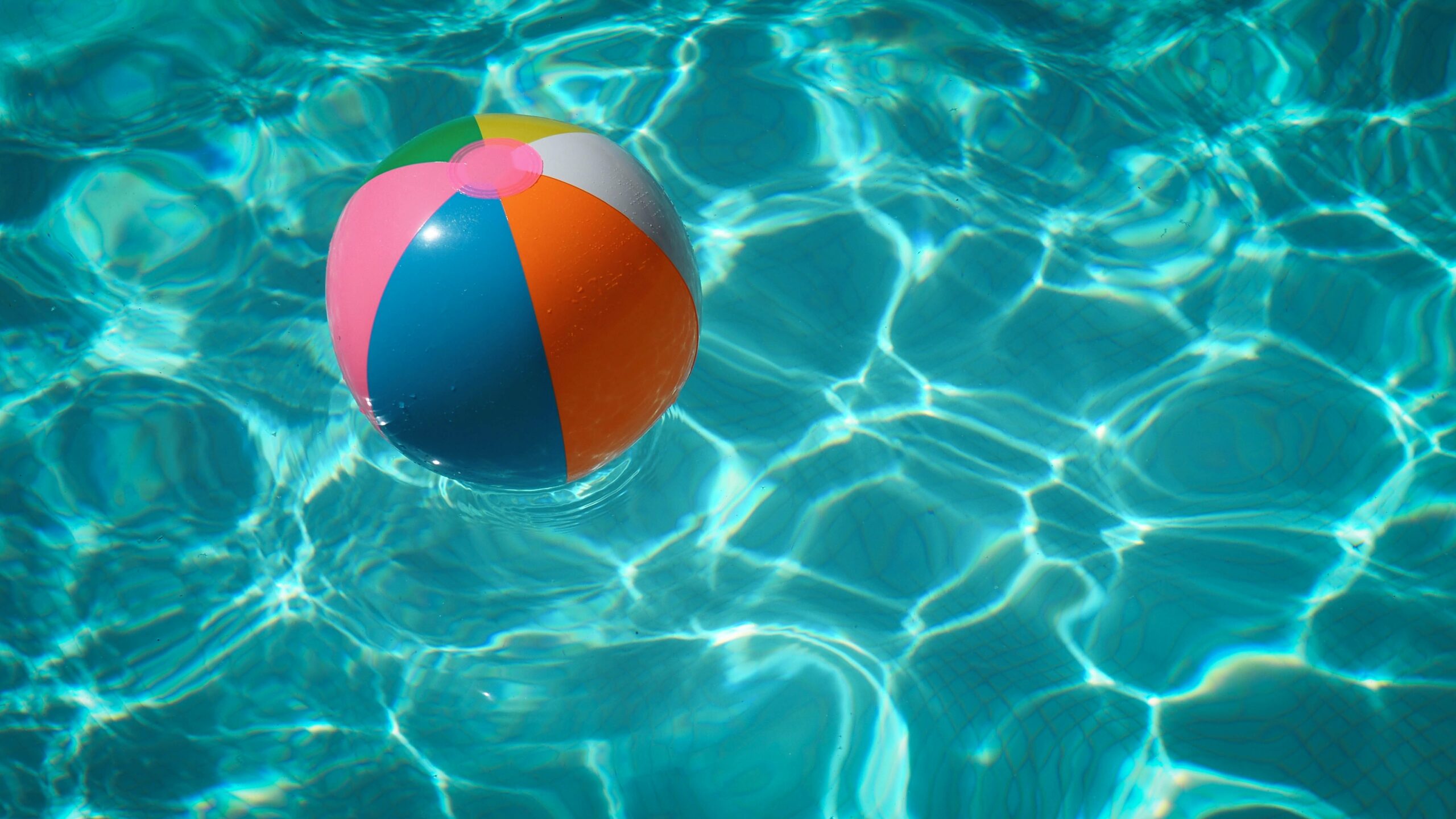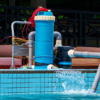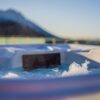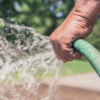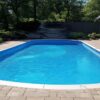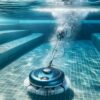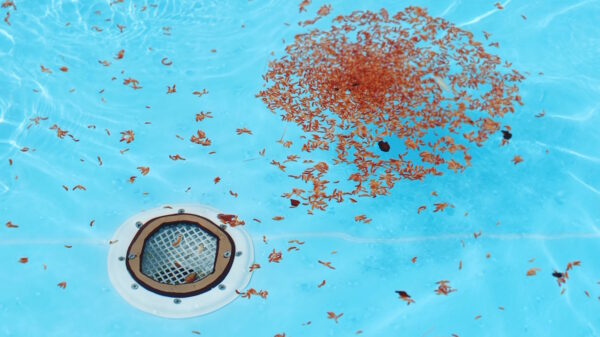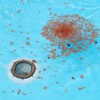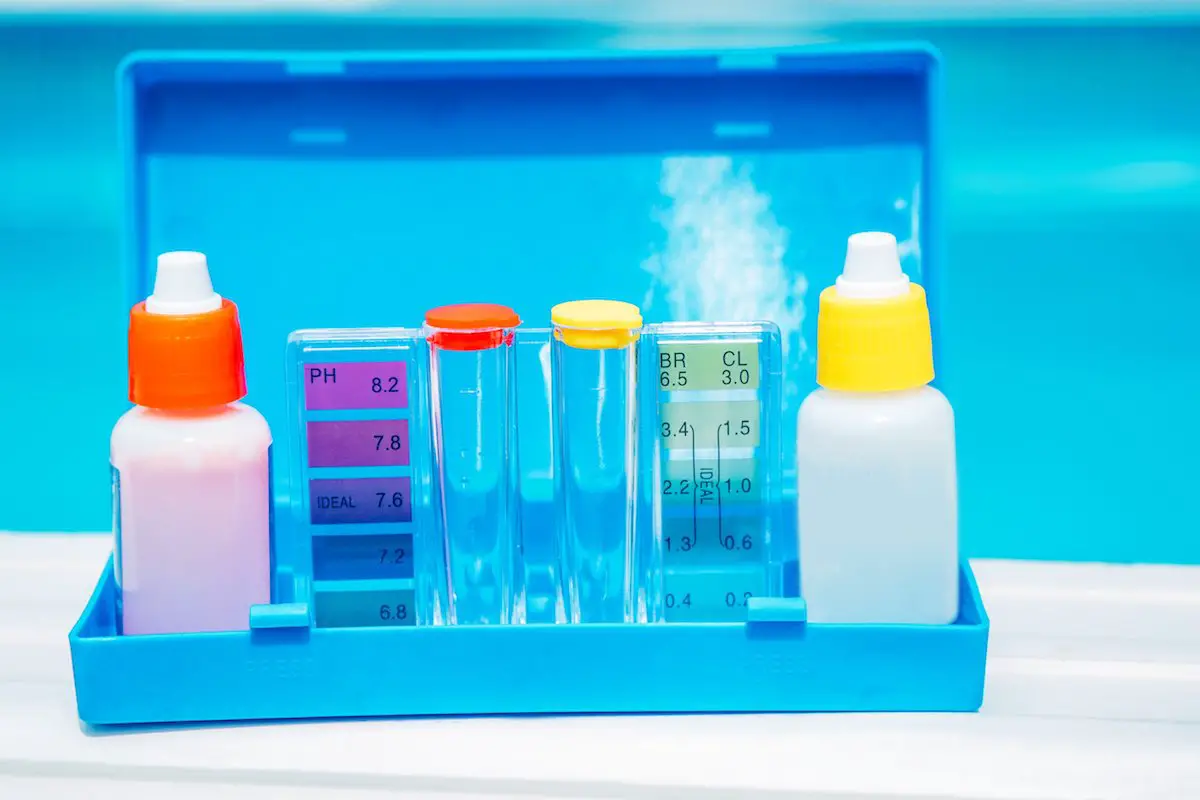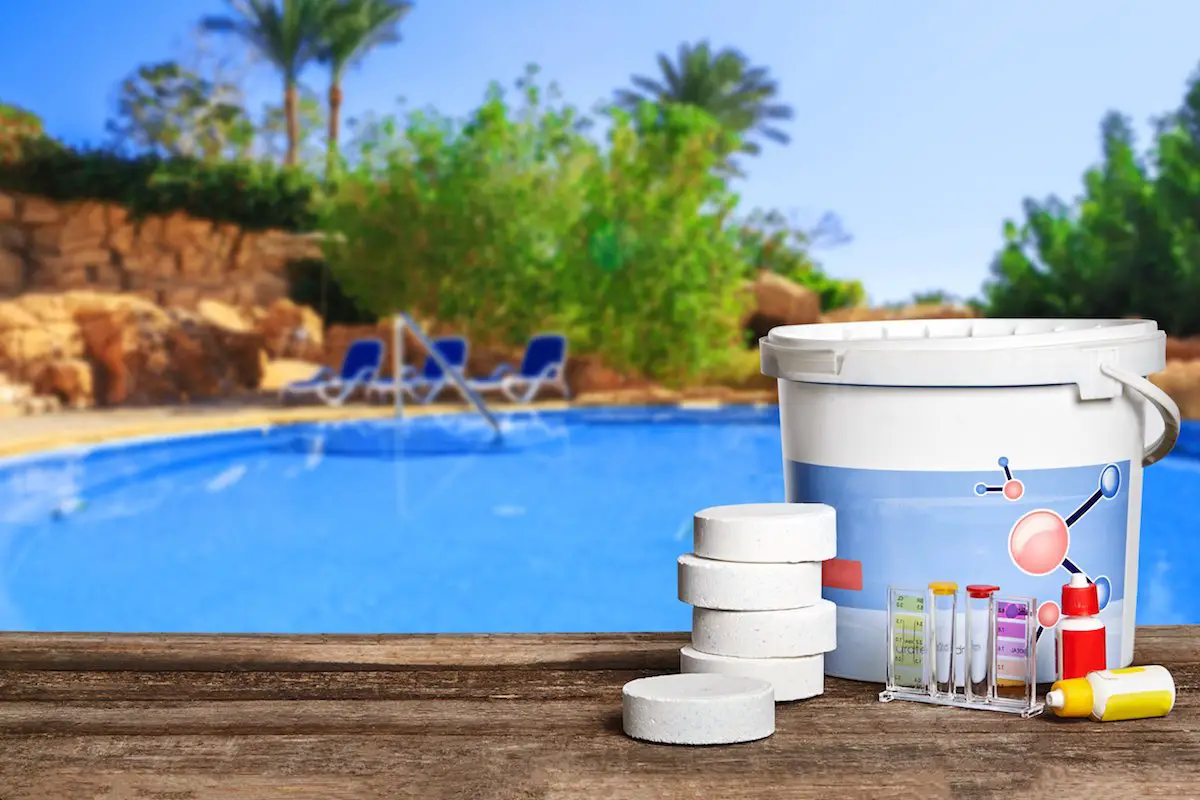What Is Calcium Buildup In Pool?
Calcium buildup in pool can prove to be a difficult task to get rid of because of the makeup of your pool. It is the white substance you see on the walls, bottom, and sides of your pool. These small particles join together over time creating clumps in your swimming pool water. If neglected, you will have a solid chunk of this calcium material inside your swimming pool.
This calcium buildup in your swimming pool surfaces is resulting from natural occurrences within pools where there is heavy use. Also, and more so if there is minimal water circulation. The most common cause is that chlorine levels are too low for efficient sanitizing. Another reason is if it is not maintained for long periods when no one uses the pool.
The calcium carbonate and other minerals that form scales are harmless in small quantities. They may even protect the metal from corrosion. When they do occur, such formations are called deposits or incrustations. To keep the pool water clear it is necessary to remove them regularly. This is so the buildup will not disrupt the flow of the water. Also, to avoid clogging up your pool’s filter. The following are some common types of calcium deposits that can occur in pools:
Single and Double Hardness Scale
- Hard water leaves behind calcium carbonate as deposits that may make your pool appear cloudy. It may even form a white film on the surface. When you have hard water, you should be able to see a noticeable buildup on the sides, floor, and bottom of the pool. In some cases, these deposits can grow very thick that they become hazardous to swimmers. They break off into small pieces which cause skin irritation. Pool water hardness is determined by the presence of calcium and magnesium dissolved in the water.
Calcium Carbonate Scale
- This type of scale is a yellowish or white color. It does not include other minerals typically found in pool deposits such as zinc, iron oxide (rust), copper, manganese, etc.
Calcium Chloride Scale or Salt Scaling
- Calcium chloride is a common scale that shows up on vinyl liner pools. It looks like white or gray crystals often called ‘salt scaling’. If you live in an area with very hard water and use salt, this type of deposit may appear every time you clean your pool. When this happens, you may need to use a different type of pool algaecide. You might also need to drain and refill the pool with a non-salt water source.
Other Types Of Scale
- In addition to hardness scale and salt scaling, there are other minerals that play an important role in scale formation such as iron oxides (rust), copper, manganese, and other metals. These minerals usually appear as a brown or red color on the surface of the pool water.

Is It Safe To Swim With Calcium Buildup In Pool?
No one likes to swim in their swimming pool when it is full of lime scale or other hard water minerals because it looks dirty and unpleasant. But how dangerous can it be? Most people try to avoid swimming in pools with hard water minerals because they are usually linked with many health issues.
For instance, skin irritation or rashes which develop within the first few days of contact may mean that your body is not capable of adjusting to high alkaline levels in this water.
Swimmers may also find their eyes might get irritated by these kinds of minerals. While this is the worst case scenario when it comes to calcium buildup in the pool, no one really wants any irritation especially if they paid good money for their swimming pool!
The Most Common Causes of Pool Calcium Buildup In Pool
1. Lack of water circulation – when there is no circulation inside the pool or poor one (by itself not enough to cause it but low levels of chlorine can do that too), air mixes with chlorinated water. It will eventually dissolve into the water and form gas bubbles. When these bubbles burst, they release their gases back into your swimming pool at such a high rate causing foam on top. This will definitely lead to calcium build-up in the pool.
2. Overuse of pH increaser – if you have a swimming pool with chlorine then adding pH increaser is not the best way to help the water become more alkaline and raise its pH level. When this happens, it can be quite easy for calcium buildup to be created in your pool. This occurs especially as that increase in alkalinity changes the overall chemistry of your swimming pool’s water.
3. Chlorine levels too low – if you didn’t maintain chlorine level then this will also be causing problems with the pH balance and eventually, calcium build-up in your swimming pool’s walls and floor surfaces will be created because chlorine plays a crucial role in removing organic material from your pool.
4. pH level too high – if your swimming pool water has high pH levels then that will also lead to calcium buildup and one way to fix that would be lowering your pH level with acid or by adding chemicals that lower alkalinity like soda ash into your swimming pool’s water system.

Can You Get Rid Of Calcium Buildup In Pool For Good?
Many pool owners are starting to realize that calcium buildup cannot be prevented completely, but they can treat and manage it. There’s a lot of different buildup removers on the market some of which work better than others. Depending on what is causing your calcium deposits, you may be able to remove them yourself or you might need professional help. The best way to find out would be to test your pool water before any additive has been put into it so that you know what is really in there (if any) after treatment by different chemicals.
Once this has been established then you will be able to make an informed decision about how best to go forward with getting rid of these hard water minerals without spending too much money and effort on finding the kind of pool cleaner that can do the job well for you.
Effective Ways To Get Rid Of Calcium Buildup in Pool
While there are many methods out there, we have listed the top 5 ways used by most pool owners that you can select from:
1. Use algaecide periodically – if you want to prevent calcium buildup in your pool, then you need to use a good quality algaecide every now and then. Some are natural and some have chemicals that may be too strong for your swimming pool so choose the one that will work best with your swimming pool’s chemistry
2. Use stabilizing chemical – instead of using liquid chlorine or hydrogen peroxide, use something like stabilizing agent because that makes the water more stable and less likely to experience those gas bubbles produced from chloramines (combination of chlorine + nitrogen).
3. Using limescale remover– this is both a prevention method as well as fixing a problem when it already happened so make sure you always keep a bucket of limescale remover sitting near or in the swimming pool because that will prevent calcium buildup as well as remove naturally occurring natural minerals from your swimming pool water.
4. Maintain proper pH level – if you want to avoid problems like this then make sure you maintain proper pH levels and chlorine levels for your swimming pool so it doesn’t get any gunk on its walls or bottom surfaces. That is where most pools go wrong because they don’t maintain chlorine levels or simply try to overdo everything and end up with terrible results. So be careful!
5. Regularly brush walls and floor surfaces – if you want your swimming pool to maintain a clean and attractive look, then you should regularly brush the floors or walls with soft bristle brushes so it removes most of those unwanted algae or dirt particles sitting on them otherwise not only does surface get dirty but also eventually may cause calcium buildup in form of scale around any joint crevices which is very hard to remove without taking apart a part of the wall cement from your covered concrete pool.
How To Get Rid Of Calcium Scale From Pool Walls
If you have a pool with calcium buildup in it and you want to get rid of that, then here are some ways that I have researched and found should work:
- Adding muriatic acid solution to the pool – Muriatic acid is used to open up “pores” in cement surfaces so that minerals can be dissolved by a chemical process known as hydrolysis 4. But you shouldn’t add too much because water may turn into an acidic condition. When this happens it also kills algae and other microorganisms found naturally in swimming pools. So don’t use it on a regular basis. You can use it more frequently if your water is fairly clean you want instant results. Try adding some baking soda along with it. This will lower the temperature of water more effectively versus letting your pool open in the sun all day.
- Regular Dish Washing Soap – You can also try using regular dish washing soap as well. Those tend to remove most limescale deposits. Dish soap also removes hard water minerals very effectively. Make sure you use it in the right concentration i.e. mix one teaspoon of detergent with a half bucket of warm water. Make sure you wear protective gloves while handling chemicals otherwise they may irritate your skin! And don’t forget to rinse off extra amounts since it is not good to leave soap residue on cement surfaces.
- Use OXI Clean – simply sprinkle some Oxi Clean powder evenly over calcium buildup areas. Allow it to sit for about 15-20 minutes. Then, brush the powder off using nylon bristles (usually included in a free bottle with purchase of this type of product). This should remove most calcium deposits from your pool walls.
Ways To Prevent Calcium Buildup In Pool
When calcium and other minerals have been dissolved in water, they tend to stick to the surfaces of your pool. This is because conditions are not met. As a result, the deposits end up creating an unpleasant effect on your skin or eyes. So it is very important that you do whatever is necessary to prevent this from happening. Here are some steps you can take:
• Cover your swimming pool – Try covering your pool when it is not in use. Covering your pool will keep out debris as well as sunlight which causes evaporation. The problem with this solution is that heat and moisture tend to build up underneath the covers. This might damage your pool or even cause it to leak.
• Try cleaning your swimming pool more frequently – Routinely give the surfaces of your pool a good scrub. Use nylon bristles to brush off any dirt particles or algae buildup in the pool. If you do this once a week there is little to no chance for calcium to buildup on your pool surface.
• Install an ion generator – These are pretty effective if you want to reduce the amount of chlorine needed in your pool. They break down calcium which settles on surfaces. It can cause problems like skin irritation or eye stinging; however, even though they work well, ion generators are not a must-have item since they’re pretty expensive.
Buildup Happens
Calcium buildup in the pool is a normal occurrence when chlorine levels are low. When the chlorine level is low it is not strong enough to kill the calcium. As the levels increase, the effectiveness of this product to eliminate other unwanted debris in your swimming pool water diminishes. The most common cause was a failure to maintain chlorine levels during long periods when the pool was not used. It is up to you to ensure that it does not become a problem. You can do this by adding either calcium removal products or maintaining appropriate chlorine levels.
You Can Enjoy a Sparkling Pool!
When you combine simple cleaning with maintenance, you should have no problems at all maintaining your pool. Just follow a few simple steps and enjoy a clean pool for years to come.
There are many causes of calcium buildup in swimming pools. The good news is that they’re almost always preventable. Not only that but cleaning it off your swimming pool walls isn’t all that hard. So don’t let the thought of having to deal with this problem discourage you from keeping your pool clean.
As a precautionary action, you can always get professional insight before taking any step forward. Some of the chemicals can cause problems for certain types of users. Also, you need to make sure you are using them properly. So by all means please be careful when handling chemicals around water and especially when they’re dissolved into water!

